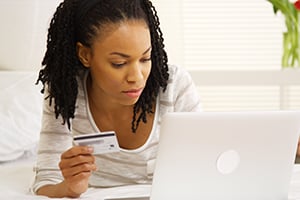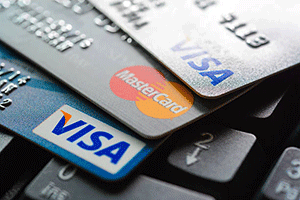In today's digitized world, nearly everyone has a debit card they use often. Although swiping a debit card has become second nature, most don't put much thought into why they use one or how beneficial it truly is.
Using a debit card comes with many benefits, and it's essential to understand when it’s best to use one over cash, checks or credit cards and why.

Debit cards are issued after opening a bank account. These cards allow cardholders to make purchases with money from their account electronically rather than withdrawing cash.
When making a purchase, the cardholder's bank account directly withdraws money and deducts it from their total amount. Debit cards also allow you to withdraw money from a conveniently located ATM without going inside a bank and waiting in line.
They also allow you to place deposits or holds on services or items, like hotel rooms, car rentals and more. Seacoast Bank’s Visa® Debit Card provides additional benefits to cardholders from the association with Visa®, such as compatibility with Visa® Checkout, Apple Pay™ and exclusive deals and offers.
With this in mind, here are six additional benefits of using a debit card over cash or checks:
Many checking account holders enjoy the convenience of using their debit cards. You can skip trips to the ATM and leave your checkbook at home. Using a paper checkbook is becoming increasingly outdated, and many retailers won't even accept checks anymore. The Federal Reserve Bank of Philadelphia estimates checks will be phased out by 2026.
Debit cards are small and convenient, fitting in any wallet or pocket. When you're ready to pay, simply swipe your card through the machine or hand it to the cashier.
If you're running low on checks, you must order more and wait for them to arrive. When you make a purchase with a debit card, all of your available funds are always at the tip of your fingers. Plus, debit cards stay valid for years after they are issued.
Debit cards also help create a speedy checkout process—all without the need to carry change, write a check or stop at the ATM.
Debit cards offer an extra layer of protection and security against theft or loss. If you lose your cash while you're out and about or forget where you've put it, there is no way to recover it unless someone turns it in.
If your checkbook falls out of your purse, there's virtually no way to keep someone from accosting your checks and using them at their discretion. With a debit card, you have control over any lost or stolen cards.
If you have no success retracing your steps to find your missing debit card, contact your bank and have them lock that specific card. Some banks even offer the ability to disable your debit card from your banking app. Once this process is complete, whoever finds your card cannot access your funds.
Your bank can then issue you a new card. If someone happens to use your card before you realize it's missing, you can file for fraudulent charges and usually reclaim your lost funds.
 The majority of people use credit cards over debit cards for two main reasons:
The majority of people use credit cards over debit cards for two main reasons:
If you have enough funds to comfortably pay for your purchase, are close to exceeding the recommended 30% maximum usage on your credit line, or already have good credit, it's best to use your debit card for your purchases.
An often overlooked benefit of purchasing with a debit card is the ability to track your purchases in real-time. Debit card transactions take money directly out of your bank account immediately. Credit cards provide monthly statements, which makes it easy to overspend or forget how close you are to your credit limit.
According to the Federal Reserve Bank of New York and the U.S. Census Bureau, the average American household accrues an average of $7,951 in credit card debt in one year.
Spending excessively on your credit card without immediate payment will require larger monthly payments. Plus, your credit score may decrease if you utilize a large portion of your available credit.
If you’re prone to excess spending or new to using credit, a debit card should be your default payment option. Knowing you don't have to keep borrowing money for your purchases is always empowering.
You don't need a credit card to build your credit effectively. By simply paying your bills on time, like rent and utilities, you'll build enough credit over the years to qualify for significant life expenses, like a home loan.
You may have no trouble spending on your credit card and paying it off each month. However, knowing you have that extra amount on your credit line can be tempting for anyone.
If you are swiping your credit card without much thought, you’re likely making impulse purchases on things you don’t truly need, and, more importantly, aren’t included in your budget (if you have one set).
By using a debit card, you can create and follow budgeting tips effectively, manage your spending in real time and prevent yourself from overspending. Most banking apps display pie charts and breakdowns to show where you spend most of your money.
This will allow you to get a realistic idea of what you spend your money on, how much you spend each month and areas to cut back on to optimize your savings.
Banking apps also allow you to create monthly budgets based on income, recurring bills and debt payments. Since your purchases come out of your account right away, you can see how much you have left to spend for the month in real time.
Innovations in technology have allowed us to use mobile wallets. By connecting your debit card to a supported payment system, like Apple Pay, you can use your debit card without having to physically carry it with you.
Mobile wallets are secure, encrypted versions of your debit card that live on your device, such as a smartphone. By utilizing a mobile wallet, you can practice optimum financial security.
With a mobile wallet, there's no risk of losing your physical debit card. If someone gets their hands on your phone, there are security measures they must go through to be able to access the mobile wallet, such as Face ID.
This is a feature cash and checks cannot offer you.
Credit cards aren't the only type of card that offers perks and benefits to its holders. These days, many debit cards also offer special perks or benefits to customers who bank with them. Therefore, you don't have to go into debt to receive rewards for your purchases.
These perks vary depending on the bank you choose, but common ones include discounts on theme parks or experiences, a percentage of savings at retail stores and discounts on hotels. When using a Seacoast debit card, you get great deals on purchases and exclusive coupons from some of your favorite retailers.
Using a debit card gives you all the advantages of a credit card and fewer disadvantages. Skip annual fees, late payment charges and transaction fees.
When it comes to local banking with Seacoast Bank, it's a no-brainer. You get all the same services you expect from a national bank while receiving individual attention and guidance from local experts.
With unique offerings, such as overdraft protection, remote deposit capture and local market knowledge, Seacoast is here to serve your community the way you deserve. Want to start reaping the debit card rewards? For more information on Seacoast Bank Debit Cards, visit your local branch or our checking account page.
Topics: Manage Your Money
Are you interested in contacting a local, Florida banker to discuss your individual financial needs? We’d love to speak with you. Schedule a consultation today.
Share: